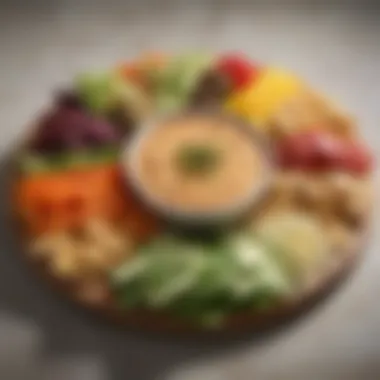Thoughtful Food Gifts for Health-Conscious Friends


Intro
Gift-giving has a unique charm, particularly when it comes to food. In an era where folks are increasingly attentive to what they consume, finding thoughtful food gifts that cater to health-conscious individuals can be both rewarding and enjoyable. Picture the delight on someone’s face when they unwrap a package brimming with nutritious goodies customized just for them. But what exactly goes into crafting such gifts? This guide will navigate you through an array of considerations, from ingredient selection to dietary preferences.
Ingredients Breakdown
Primary Ingredients
Selecting primary ingredients is where the fun begins. Here are some excellent choices to start with:
- Nuts: Almonds, walnuts, and cashews are wholesome delights. They’re rich in good fats and protein.
- Seeds: Consider chia seeds or flaxseeds for an omega-3 boost.
- Whole Grains: Quinoa, oats, or brown rice offer fantastic options for healthful grain gifts.
- Dried Fruits: Go for unsweetened apricots or goji berries. They add a sweet touch without added sugars.
Optional Ingredients
Don’t be shy to get creative with optional ingredients that enhance flavor or texture:
- Herbs and Spices: Fresh herbs like basil or spices such as cinnamon can elevate any dish.
- Honey or Maple Syrup: Excellent for a touch of natural sweetness, but don’t overdo it!
- Dark Chocolate: A splendid guilty pleasure if chosen wisely (70% cacao or more is often best).
Essential Kitchen Tools
Before diving into preparation, ensure you have the needed tools at hand:
- Sharp knives for precise cutting.
- Mixing bowls in various sizes.
- Measuring cups and spoons for accuracy.
- Airtight containers for storage and gifting.
Step-by-Step Preparation
Prepping the Ingredients
The preparation stage sets the tone for your food gifts. Thoroughly wash and dry fruits and vegetables. If you’re dealing with grains or beans, soak them before cooking for the best texture. Cutting, chopping, or blending can create different textures - be mindful of the overall presentation.
Cooking Techniques and Methods
Cook with intention. Steaming, roasting, or quick sautéing often retain nutrients better than boiling.
- Roast nuts with spices for a flavorful snack.
- Prepare a grain salad bunching the cooked grains with veggies and a light dressing.
Assembly and Presentation Tips
Once your components are ready, assembly becomes an art form. Arrange your ingredients in colorful layers, using glass jars or rustic baskets. Adding a personal touch, like a small note or a label, can make all the difference. Remember to play with colors and textures—nobody can resist a visually appealing gift!
Dietary Considerations
Gluten-Free Options
For those avoiding gluten, consider incorporating:
- Quinoa.
- Rice-based pasta.
- Almond flour baked goods.
Vegetarian and Vegan Substitutes
Craft your gifts accordingly whether someone is vegetarian or vegan:
- Use plant-based yogurt instead of dairy.
- Substitute eggs with flaxseed meal in baking for a great vegan option!
Nutrition Facts & Nutritional Considerations
Highlight nutritional aspects that might resonate with recipients. Prepare a small note detailing what each ingredient brings to the table, such as:
- Quinoa is protein-packed and gluten-free.
- Nuts offer heart-healthy fats and vitamins.
Variations and Customizations
Flavor Enhancements
Consider unique flavor twists:
- Infused olive oil or vinegar can offer a gourmet touch.
- Adding zesty citrus zest or juice can brighten flavors.
Alternative Cooking Methods
Experiment a little! Air-frying can give items a crunchy texture without excess oil and roasting can bring out a delightful sweetness in veggies.
Pairing Suggestions (Sides, Drinks, etc.)
Don’t forget to suggest pairings for your gifts. For example, a quinoa salad might pair beautifully with herbal tea or citrus-infused water.
Common Questions and Answerss and Troubleshooting


Frequently Asked Questions
- How long do homemade food gifts last?
Typically, you can store them for about one week in the refrigerator or a few months if frozen. - Are food gifts appropriate for all occasions?
Certainly! From birthdays to holidays, they fit the bill perfectly.
Common Mistakes to Avoid
- Overcomplicating recipes can lead to frustration, so simple is often best.
- Not considering allergies or dietary restrictions could make your gift less thoughtful.
Solutions to Potential Problems
If a recipe doesn’t turn out as planned, keep calm! Adjustments can often be made, like adding more spices or sauces to improve flavor. And remember, not every dish needs to be perfect; sometimes, it’s the sentiment that counts.
Understanding Healthy Food Gifting
Gifting food can be more than just a nice gesture; it can also be a way to express care and consideration for someone's health. When embarking on the journey of healthy food gifting, it's essential to grasp not just the superficial elements but the deeper significance behind it. In this section, we explore why thoughtful food gifting matters and the importance of defining what constitutes healthy foods.
The Importance of Thoughtful Gifting
Giving a food gift that is well-rounded and health-conscious can turn heads and warm hearts. It's about thinking well ahead, beyond the immediate offering. When you put thought into the gift, you show that you respect the recipient’s values, preferences, and taste. A thoughtful gift can create a connection that transcends the material item itself. For instance, when you choose organic snacks or homemade goodies, you likely are catering to someone who cherishes their health.
Additionally, thoughtful gifting can be a fantastic conversation starter. Have you noticed how sharing a healthy treat can spark discussions about wellness, new recipes, or even lifestyle changes? It's these very moments that can deepen friendships or strengthen family ties. Thoughtful gifting is not just about giving; it's about fostering relationships through shared values of health and nutrition.
Defining Healthy Foods
To navigate the realm of food gifting effectively, understanding what qualifies as healthy food is crucial. But, what does healthy food mean in a world swirling with diverse opinions and dietary needs?
Healthy foods typically include items that are nutrient-dense, rich in vitamins, minerals, and other essential compounds. These can include:
- Fresh fruits and vegetables: Think vibrant produce that’s bursting with flavor and nutrients.
- Whole grains: Items like quinoa, brown rice, and oats that provide sustained energy.
- Lean proteins: Choices like chicken, turkey, and legumes.
- Healthy fats: Options such as avocados, nuts, and olive oil.
However, healthy eating is not one-size-fits-all. Different diets resonate with different people. For example, a vegan would classify lentils and tofu as healthy, while someone following a paleo diet might lean towards grass-fed beef and sweet potatoes.
In summary, healthy food gifting requires thoughtful consideration of your recipient’s dietary restrictions and preferences. This means it’s not just about what you find healthy; it’s essential to align with what resonates with the person you’re gifting to.
"A gift is not just a present; it’s a glimpse into your understanding of what the other person values and cherishes."
Through understanding the layers of healthy food gifting, you can take steps that lead to thoughtful selections which will surely be appreciated.
Identifying Dietary Preferences
Understanding dietary preferences is essential when selecting food gifts for anyone who prioritizes health. Knowing what your recipient enjoys or avoids can make the gifting process smoother and the final gift more meaningful. Paying attention to these choices shows thoughtfulness and consideration. It can also prevent awkward situations where the gift might go to waste.
When considering dietary preferences, think about factors such as lifestyle choices, health conditions, and even personal beliefs. Each individual's relationship with food is unique, and being aware of their needs can enhance the gift-giving experience.
Vegan and Vegetarian Options
When it comes to vegan and vegetarian gifts, the options are plentiful, but it's crucial to focus on quality ingredients. Here are a few ideas that can tickle the taste buds of those who lean towards plant-based diets:
- Nut-Based Cheeses: These are often made from cashews or almonds and can be a delightful treat. They offer a creamy texture and rich flavors, perfect for indulging without the dairy.
- Homemade Granola: A mix of oats, seeds, and dried fruits can be personalized to match the recipient's taste. You can include options such as maple syrup or nut butter to add flavor.
- Vegetarian Jerky: Made from mushrooms, soy, or jackfruit, this can be an exciting, chewy snack that's full of flavor but devoid of meat.
Beyond just the food items, consider adding a personal touch, like a recipe card with how to use the products in innovative ways. This can turn a simple gift into an enjoyable experience.
Gluten-Free Selections
In today’s world, gluten sensitivity is something many individuals face, and gluten-free gifts can greatly enhance your recipient’s culinary enjoyment. When selecting gluten-free goodies, here are some options to consider:
- Quinoa or Rice-Based Treats: These can be transformed into various snacks, from puffed chips to sweet rice cakes infused with flavors.
- Gluten-Free Baking Kits: Providing a kit with gluten-free flour, baking soda, and spices could spur creativity in the kitchen.
- Specialty Pasta: Gluten-free pasta made from alternatives like chickpeas or lentils can make for a delightful meal that doesn’t sacrifice flavor.
Choosing gluten-free options not only supports their dietary restrictions but also shows that you put thought into customizing their gift.
Low-Carb and Keto-Friendly Gifts
Low-carb and ketogenic diets have gained traction, and gifting options that cater to these preferences can be a hit. Here are some enticing choices for those on the keto train:
- Nut Butters: Almond or hazelnut butter can add richness to various meals and snacks while keeping carb counts low. They’re excellent for spreading on celery or pairing with apple slices (for those not strictly keto).
- Keto Snack Boxes: Curating a box of nuts, seeds, and cheese crisps offers tasty ways to munch mindfully. You can include sugar-free chocolate to tickle the sweet tooth.
- Low-Carb Baking Mixes: Brands that specialize in low-carb mixes can help your recipient whip up something delicious without the guilt.
These selections align with a health-conscious lifestyle while still being enjoyable and indulgent.
"Thoughtful gifting goes beyond the product; it’s about embracing the recipient’s journey and preferences."
Homemade Food Gifts
When considering food gifts for health-conscious individuals, the notion of homemade creations carries a charm that no store-bought alternative can match. Homemade food gifts speak not just to the recipient's taste, but also reflect the thought and effort poured into their crafting. With the emphasis on fresh, wholesome ingredients, homemade gifts serve as an embodiment of love and care. They can also be tailored precisely to an individual's dietary needs and preferences, ensuring no one feels left out.
In today’s fast-paced world, there is a profound connection generated through sharing homemade goodies, which often leads to cherished memories and heartfelt messages. This makes them a one-of-a-kind gift that beats mere purchases any day.
Crafting Nutritious Gift Baskets


Creating nutritious gift baskets allows for creativity and personalization. A well-crafted basket can capture various themes, like breakfast, snacks, or even a wellness retreat at home. Incorporating fresh fruits, homemade granola, or artisan nut mixes can give the basket vibrancy and appeal. Adding homemade jams or nut butters introduces unique flavors that can elevate the overall gifting experience. The beauty of this approach is its versatility; you can mix and match, ensuring that every recipient feels special.
Preserving Fruits and Vegetables
Preserving fruits and vegetables is a fantastic way to maintain seasonal flavors while offering delightful gifts year-round. Techniques like canning allow you to create jars bursting with flavor, that offer a taste of summer even in the throes of winter. Let’s delve deeper into a few popular preserving methods:
Jams and Jellies
Jams and jellies stand out as a beloved choice for healthy food gifting. With their sweet and tangy taste, they can spark joy at breakfast or in baking. You can make them with lower sugar alternatives, tailoring them to someone’s dietary preferences. The beauty of homemade jams rests in the freedom to choose ingredients. You might consider fresh berries, peaches, or even herbs for a unique twist.
An advantage is the satisfaction of knowing what’s inside, without any mystery ingredients usually found in store brands. However, it can be a time-consuming process.
Pickles
Pickles, on the other hand, have gained a cult following in the recent years where crunchy and briny flavors rule. They make an awesome gift that adds zest to any meal, while offering gut health benefits through fermentation. Also, dill, garlic, or any spice can be played with to add 'wow factor'. The jars can be visually appealing, with layers of colorful veggies – a feast for the eyes as well. Yet, the tanginess might not appeal to all, so it’s good to know the recipient’s palate.
Fermented Foods
Fermented foods bring another dimension to homemade gifting. Think of kimchi, sauerkraut, and kefir. These options are not just about flavor; they turn typical food into power-packed options loaded with probiotics. They can add rich depth to meals and can be great conversation starters. A disadvantage might lie in the niche appeal; some folks might be unsure about the taste, so a gentle introduction is advisable.
Baking Health-Conscious Treats
Baking can be a creative outlet, and making health-conscious treats opens the door for health without sacrificing flavor. Each baked good can be crafted with specific dietary considerations in mind. Let’s break down some baking options:
Low-Sugar Options
Low-sugar options can be a game changer, especially for those managing sugar intake. Using alternatives like stevia or mashed bananas can create delicious treats without the sugar crash, while still being sweet enough to satisfy cravings. The allure of these options lies in their guilt-free nature—perfect for both giftable goodies and personal enjoyment. However, finding the right balance so the flavor remains intact can necessitate some trial and error.
Whole Grain Recipes
Whole grain recipes not only boost fiber content but also deliver a nutty flavor that elevates the treat. Think of spelt, oats, or barley, which can be a great base for cookies, bread, or even muffins. Not only would these delights be wholesome, but they also present as thoughtful gifts when wrapped beautifully. Individual preferences can sometimes lean towards more conventional choices, so offering a taste test could add a nice touch.
Utilizing Superfoods
At the end of the day, incorporating superfoods such as chia seeds, quinoa, or cocoa nibs can significantly elevate the health profile of baked gifts. These ingredients may not only enrich the nutritional value but also jump on current food trends, making them exciting to receivers. The major downside is the potential increase in costs and sourcing unique ingredients can be a bit tricky at times.
Homemade food gifts foster connections and provide a tangible expression of affection, skill, and thoughtfulness, which is often missing in our day-to-day lives.
Pre-packaged Healthy Food Gifts
When it comes to gift-giving, the ease and comfort of pre-packaged healthy food gifts cannot be overstated. They offer a practical solution for those who wish to provide thoughtful yet health-conscious options without the hours of preparation associated with homemade gifts. In today's fast-paced lifestyle, these gifts serve as a perfect blend of nutrition and convenience. They typically focus on quality, enabling you to provide something that not only tastes good but is also beneficial for the body.
Choosing packaged healthy foods allows you to explore a vast array of options, from self-care to diet-specific gifts. It opens doors for creativity in curation and makes it easy to cater to various dietary needs while ensuring quality ingredients are prioritized. Further, there's something quite satisfying about the visual appeal of beautifully designed packaging that enhances the gifting experience.
Choosing Quality over Quantity
In a world filled with fast food and high-calorie snacks, choosing quality over quantity rings true, especially in healthy food gifting. When selecting pre-packaged food gifts, prioritize brands that focus on whole, natural ingredients. Look for products that clearly list ingredients on the label and shy away from those overflowing with additives, preservatives, and sugars.
But remember, quality doesn’t always mean spending a fortune. Many small brands offer exceptional products at affordable prices, proving there’s great value to be found when you dig a little deeper. A well-chosen selection may infuse a sense of luxury and thoughtfulness that goes beyond mere consumption, hinting at the care with which the gift was chosen.
Exploring Artisan Brands
Artisan brands have gained a reputation for their commitment to craft and authenticity. Gifting artisan products doesn’t only guarantee higher quality, but it also supports local and small-scale producers. These brands often emphasize sustainable practices and use ingredients sourced responsibly. This means that each gift includes a story and supports a worthwhile cause.
Look for brands that take pride in their ingredients—like small-batch nut butters or handcrafted snack bars. They generally have a unique selling point, be it an unusual combination of ingredients or innovative flavors. With the right artisan picks, you can introduce your gift recipient to new tastes and textures that they might not encounter in mainstream imitations.
Gift Sets Focused on Health
When curating gift sets focused on health, consider the possibilities within niche categories. This approach allows for diverse selections, catering to various preferences and nutritional needs.
Tea and Herbal Infusions
Tea and herbal infusions make for delightful gifts, not only because of their flavors but also their myriad health benefits. From soothing chamomile to invigorating green tea, each serves as a comforting companion. These infusions are often cleanse-focused or packed with antioxidants, making them a popular choice among health enthusiasts.
What sets them apart is their natural ability to cater to different dietary needs—caffeine-free, vegan, gluten-free—that anyone can enjoy. The unique flavors of artisan blends, quite often, include a thoughtful mix of herbs, vegetables, and spices that promote overall health benefits, making them a gift that truly keeps on giving.
Spice Blends
Gift sets of spice blends offer more than just flavor; they bring the ability to create and explore culinary diversity. High-quality spice blends often feature organic or ethically sourced ingredients that add depth to any dish, allowing recipients to experiment in the kitchen while maintaining a healthful diet.
The inclusion of various spices can also make healthy meals more appealing, encouraging the recipient to try new recipes without straying from their health goals. However, it's essential to ensure that no unhealthy additives hiding within are lurking in these blends. A carefully curated selection can inspire creativity while emphasizing health.
Nut Butters and Snacks
Nut butters and healthy snacks stand out for their versatility and ease of enjoyment. They are rich in healthy fats, proteins, and fiber, making them not only delicious but also satisfying. High-quality nut butters have the added benefit of being free from unwanted ingredients, and while they are often consumed as dips or spreads, their usability extends to smoothies or baked goods.
Selecting ethically sourced nut butters highlights a commitment to quality. Some brands also offer unique flavor combinations, like maple pecan or spicy almond, which can add an interesting twist to the classic favorites. All of these factors contribute to making nut butters essential items in the arsenal of healthy eating, staking their claim as popular pre-packaged food gifts.


"Thoughtful gifting can bridge gaps, whether through quality ingredients or artisan craftsmanship. It’s a reflection of care and consideration that resonates deeply. "
Personalizing Food Gifts
Personalizing food gifts is not merely a finishing touch; it’s a vital aspect that adds depth and meaning to the act of gifting. This personalized approach transforms a simple gift into a thoughtful token that speaks volumes about the giver's consideration of the recipient's preferences and dietary choices. By tailoring food gifts, one acknowledges individuality, making the experience more memorable and heartfelt.
Personalized gifts show that you've put extra time and thought into your choice. For healthy eaters, this becomes even more paramount. There’s a multitude of aspects to consider, such as personal tastes, dietary restrictions, and health goals. Taking those into account ensures that your gift will likely be appreciated and utilized rather than left on a shelf.
Incorporating Personal Preferences
When selecting food gifts, recognizing and incorporating personal preferences is key. Whether your friend prefers a spicy kick in their food or a sweeter touch, understanding these little details can turn a standard gift into something extraordinary.
Using ingredients they love is one way to ensure that your gift resonates with them. Perhaps they enjoy particular snacks or have a penchant for certain flavors. A custom snack box filled with their favorite healthy treats serves as a delightful surprise.
In addition to taste, considering dietary restrictions plays a significant role. Knowing if your recipient is gluten-intolerant or allergic to nuts can make all the difference. Gift options that are specifically relevant to their needs show that you care, reinforcing the bond you share.
Adding a Personal Touch
Incorporating personal touches is what further elevates your food gifts from ordinary to unforgettable. Here are some specific ways to do just that:
Customized Labels
Customized labels offer a straightforward yet effective method of personalizing food gifts. They allow you to add a touch of charm and individuality—be it simple names, encouraging messages, or special dates. One important characteristic of customized labels is that they make every gift visually distinctive and enhance the overall aesthetic appeal. This can be particularly beneficial in a practical sense, helping recipients keep track of what's what, especially in a variety pack of snacks.
Unique features of customized labels include the ability to choose colors and fonts that match your or the recipient's taste. On the downside, designing elaborate labels can sometimes take more time than expected, but the payoff in personal connection is often worth the effort.
Handwritten Notes
Handwritten notes serve as a classic yet powerful way to personalize food gifts. The act of putting pen to paper creates a certain warmth and sincerity that digital messages simply can’t replicate. An essential characteristic of handwritten notes is their ability to convey emotions more authentically.
These notes should encapsulate the sentiment behind the gift, offering words of encouragement or gratitude. The unique feature here is the human element—your handwriting is inherently yours, adding a layer of connection. One potential drawback is the risk of unclear handwriting, which could lead to misinterpretations. However, a heartfelt message generally trumps any imperfections in penmanship.
Presentation Ideas
Food gifts don't just end with the contents; how they’re presented matters just as much. Presentation ideas can elevate the entire gifting experience and capture attention right away. The key trait of good presentation is its ability to enhance anticipation and excitement.
Creative wrapping, decorative boxes, or even eco-friendly containers can add layers of charm to your gift. Each of these options can be tailored to fit the recipient's style, ensuring that your gift stands out. The unique advantage of focusing on presentation is that it makes the gift feel special and well thought out, reflecting the care you took in selecting and preparing it. Consider potential downsides, like the need for more materials, which can sometimes lead to a more expensive gift—but the impact is often worth it.
The Art of Presentation
In the realm of food gifting, how a gift is presented can make a world of difference. The presentation transforms a simple food item into a heartfelt token of affection. In this context, it’s not merely about wrapping; it’s an art that reflects thoughtfulness and creativity.
When one puts effort into the aesthetic aspect of a food gift, it speaks volumes. It shows the recipient that you took the time to consider not just the item itself but also how it reflects your relationship. The right presentation can enhance the perceived value of the gift, making even the most modest of items sparkle.
Aesthetic Packaging Techniques
Aesthetic packaging isn’t just eye candy; it is the first impression a recipient has of your food gift. Consider using various textures, colors, and shapes.
- Color Theory: Different colors evoke different emotions. Warm colors like red and orange can stimulate appetite, while green tones often represent freshness and health.
- Layering: Use various materials for layering. A simple kraft paper wrap can be jazzed up with twine, custom labels, or even a sprig of rosemary on top for an herbal aroma.
- Unique Containers: Instead of just decorative bags, think outside the box. Use mason jars for jams or pickles, or small wooden crates for a rustic touch.
- Visual Height: Consider the vertical aspect of your presentation. Stacking treats or arranging them in varying heights can create visual interest.
- Personalization: Incorporate elements that personalize the gift. This could be a small card with a handwritten note, detailing why you chose those particular items or a memory associated with them.
A thoughtful wrap can elevate the gift experience significantly. Remember that it’s all about the story you tell through the aesthetics of your presentation.
Eco-Friendly Wrapping Options
With the growing awareness of environmental concerns, many seek ways to align their gifting habits with sustainable practices. Eco-friendly wrapping options are not just trendy; they show a level of social responsibility.
- Recycled Materials: Consider wrapping your gifts in newspapers or old maps. It adds a unique touch while keeping waste at bay.
- Fabric Wraps: Furoshiki, a traditional Japanese method of wrapping with cloth, can be both beautiful and functional. After the gift is opened, the fabric can be reused.
- Plant-Based Materials: Biodegradable packing peanuts and recycled paper ribbons are excellent choices for modern, eco-conscious gifting.
- Upcycled Items: Use leftover packaging materials in a creative way. Old jars can serve as delightful containers, and gift bags made from scrap paper impart a raw charm.
"The packaging should reflect not just the contents but the values of the gift giver."
- Compostable Wrapping Papers: Opt for wrapping paper made from sustainable sources that can decompose after use, minimizing the ecological footprint.
In summary, taking the effort to present food gifts beautifully and sustainably demonstrates thoughtfulness and care, elevating the experience for both giver and receiver. Engaging in the artistry of food gift presentation is bound to foster lasting impressions.
Epilogue: The Value of Healthy Gifting
In the realm of food gifting, the choices we make harmonize with an underlying principle: to enhance connections while fostering healthy habits. Food gifts, when selected with intention, do far more than fill bellies. They create bridges between givers and receivers, communicating feelings and thoughts through the universal language of nourishment. Healthy gifting is not merely about the act of giving; it embodies a holistic approach, where the excitement of sharing good food translates into shared experiences and mutual care.
Fostering Connections through Food
Gifting nutritious foods has a unique way of cultivating bonds among friends and family. It’s more than just a present; it’s a conversation starter, a piece of one’s thoughtfulness wrapped up in a delicious package. Imagine surprising a friend with a carefully curated basket filled with artisanal nut butters, homemade granola, and a selection of dried fruits. This gesture not only showcases your attention to their dietary preferences but also inspires the recipient toward healthier eating habits. The early mornings spent together enjoying that granola over coffee can lead to meaningful conversations, bringing a nourishing essence to both the palate and the relationship.
Sharing food allows us to unravel stories from our past, and creates memories worthy of cherishing.
Healthy food gifts can be exceptionally fitting for various occasions—birthdays, holidays, or just a simple gesture to say, "I care." By thoughtfully considering someone’s dietary needs, you’re communicating empathy and recognition. High-quality ingredients speak volumes about your commitment to the person’s well-being.
Encouraging Health and Wellbeing
The act of giving healthy food gifts extends the dialogue of health and well-being. It bridges the gap between affection and mindfulness towards better eating habits. Selecting gifts like organic teas, whole grain snack bars, or gourmet spice blends conveys not just a hope for enjoyment but an encouragement toward healthful choices. Each item can serve as a gentle nudge towards a more nutritious lifestyle.
Moreover, the impact of these gifts can resonate beyond the moment of receipt. They can inspire recipients to explore new flavors, experiment in the kitchen, and ultimately make better food choices. By introducing someone to a novel healthy food item or a nutritious recipe, you could be catalyzing their journey toward improved health.
To sum it up, healthy gifting isn’t merely a fad; it’s a thoughtful approach rooted in connection and care. Within this framework, the gifts transform into tools that nurture relationships and promote well-being. Through each thoughtful selection, we affirm our commitment to celebrating healthy choices—celebrating life, one delicious bite at a time.







